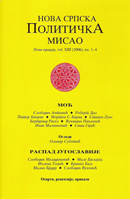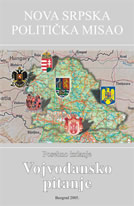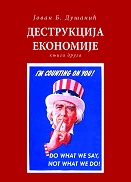| NSPM in English | |||
The Friend of My Enemy |
 |
 |
 |
| уторак, 01. април 2008. | |
|
Thomas Graham, senior director at the National Security Council for Russia from 2004 to 2007, offers advice to Presidents Bush and Putin before their meeting on Sunday. What sort of agenda might lead to an improvement in U.S.-Russia relations? Post the NATO summit can they do more than paper over missile defense, Iran and energy? This is taken from his forthcoming article, “The Friend of My Enemy,” that will appear in the May/June 2008 issue of The National Interest. There are … steps we could take immediately that bear directly on how Moscow sees its interests in and with Iran and that could change the cost-benefit analysis in favor of closer cooperation with the United States . Four stand out: First, conclusion of the 123 Agreement [an agreement that clears the way for cooperation on civilian nuclear projects]. The agreement was initialed last summer, with final signature pending required reports from U.S. agencies on Russia 's nuclear policies. Not surprisingly, those reports have become caught up in the ongoing debate inside the administration over Russia 's nuclear cooperation with Iran . The same forces that opposed closer cooperation with Russia in the first term are fighting a rearguard action now. But holding out the agreement in return for Russian good behavior is a nonstarter, as it was in the first term. To the contrary, signing this agreement is critical to convincing the Russians that we are serious about closer cooperation and the commercial rewards that will accrue to both the United States and Russia . The agreement is only a framework agreement, and separate agreements will have to be reached for each specific cooperative project. But without the agreement, talk of additional concrete cooperation is just that, talk. With [an agreement], various entities [both Russian and American] can begin to move on concrete projects that would far outweigh the benefit of cooperation with Iran . Steps toward a joint U.S.-Russian commercial venture to build proliferation-resistant reactors in third countries would not only hold out the prospect of great commercial gains, but they could also reassure Moscow that it would not be pushed out of the Iranian nuclear-reactor market should relations between Iran and the United States ever normalize. Second, more intense efforts to work jointly with the Russians on missile defense. As Henry Kissinger has pointed out, Putin's proposal on missile defense—in essence to link U.S. and Russian systems in some way—could be nothing more than a tactical maneuver to split the NATO allies and undermine U.S. efforts to deploy elements of a system in Poland and the Czech Republic . Nevertheless, he has argued, we need to explore Putin's proposal seriously, because if we could find a way to work together, that would mark a strategic revolution and would place the issue of Iran in a radically different—and more promising—framework. Although the discussions have proceeded with fits and starts, and significant distance still divides the two sides, it is far too early to abandon negotiations. Continued discussions in themselves are an element of pressure on Tehran . One starting point for further cooperation could be a joint investigation of the missile threat from Iran , something that would only add to the pressure. Third, recalibration of the rhetoric on Europe's energy dependence on Russia . The administration has hammered away on the downsides of this dependence. Every time Russia announces a pipeline deal involving the European market, the administration cannot resist pointing to its own—so far unsuccessful—efforts to build support for an alternative. But the truth is that Europe will need every bit of energy it can get from Russia to meet future demand and then some. The more pragmatic approach would be to welcome growing Russian supplies to Europe and Russian involvement on commercial terms in Europe's energy sector, while still underscoring the pressing need for other sources—and therefore additional pipelines. We should make clear that if Iranian gas ever flows to European markets, we would not be opposed to Russian equity participation in such ventures. Fourth, graduation of Russia from Jackson-Vanik. The administration is inclined to wait until Russia is on the verge of entering the World Trade Organization (WTO) before taking this step. Once Russia is in the WTO, the amendment will work against U.S. business interests, and the administration calculates that introducing it then will reduce the political cost of persuading Congress to act favorably on Jackson-Vanik. Russia could be ready to enter the WTO later this year, but the administration would gain some goodwill and enhance its credibility in Moscow by beginning the push now and following through even if Russia 's entry is delayed. None of these steps are concessions to the Russians or a reward for bad behavior, as some would have it. All would impact Russia 's cost-benefit analysis on Iran . In the end, they may prove too little to move Moscow toward significantly closer cooperation on Iran given the overall state of U.S.-Russian relations and the deep distrust and suspicion on both sides. All, however, are profoundly in our own national interest, even absent our concerns about Iran . As a general rule, we should be prepared to accommodate Russian interests where we can without jeopardizing our own. Surely, we should be prepared to pursue our own interests if that would also accommodate Russia's and increase the chances that Russia would work more closely with us and our European partners in pressuring Iran to abandon its nuclear-weapons program. Thomas E. Graham was the senior director for Russia on the National Security Council from 2004 to 2007 and the director for Russian affairs on the National Security Council from 2002 to 2004. He is now a senior director at Kissinger Associates, Inc. (01.04.2008, The National Interest)
|
Од истог аутора
Остали чланци у рубрици
- Playing With Fire in Ukraine
- Kosovo as a res extra commercium and the alchemy of colonization
- The Balkans XX years after NATO aggression: the case of the Republic of Srpska – past, present and future
- Из архиве - Remarks Before the Foreign Affairs Committee of the European Parliament
- Dysfunction in the Balkans - Can the Post-Yugoslav Settlement Survive?
- Serbia’s latest would-be savior is a modernizer, a strongman - or both
- Why the Ukraine Crisis Is the West’s Fault
- The Ghosts of World War I Circle over Ukraine
- Nato's action plan in Ukraine is right out of Dr Strangelove
- Why Yanukovych Said No to Europe

.jpg)






















